- Undergraduate
Electronic Music Production BA (Hons)
Overview
Why study at the University of West London?
- Ranked 30th university in the UK - The Guardian University Guide 2025
- Our Music courses are ranked #2 in London for modern universities* - Guardian University Guide 2025
- Number 1 London university for overall student satisfaction - National Student Survey 2024**
- Best university for Student Experience and Teaching Quality in the UK - The Times and Sunday Times Good University Guide 2024
Why study this course?
This course takes people with an existing passion for electronic music and through a systematic programme of artist development, equips them with the skills and confidence to achieve their creative goals.
Each artist on the programme will be exposed to the huge range of opportunities that exist in the music industry, to exploit the commercial potential of their talents.
The University of West London provides a unique approach to the field of electronic music education by allowing space for individual talent to flourish.
The course is carefully structured to recognise and nurture your unique artistic identity, allowing you to develop and grow over three distinct years of study as a composer, performer and freelance producer.
During the course, you will be able to work with a wide range of musicians and artists in one of the largest audio complexes in Europe.
View some of our students' recent work.
Level-6 Top-up Option
If you already have a relevant Level 5 qualification (such as a Higher National Diploma, NVQ Level 5 etc) then you can top this up to a full honours degree with our Level 6 Top-up course. This course consists of a full year of studies covering the same modules as Year 3 of the regular degree.
Select your desired study option, then pick a start date to see relevant course information:
Start date:
If your desired start date is not available, try selecting a different study option.
Why study Electronic Music Production with us?


What our students say…
I'm glad I have found a place that teaches not just a field of my interest but also assists me to broaden my vision and skills necessary for this competitive industry. The courses are designed with current awareness and state-of-the-art facilities, also the staff and lecturers are very supportive and understanding. I could not be happier with my chosen course and University.
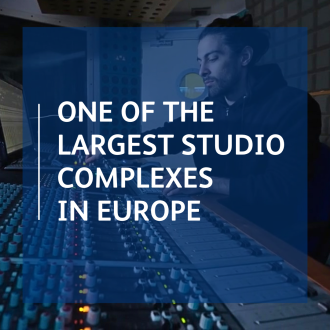
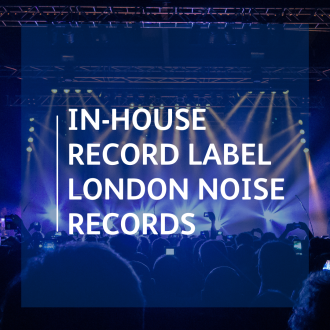


Course detail & modules
This course is a three-year journey of personal artistic development and musical creativity in which you will learn to harness and master hardware and software instruments to develop and perfect your productions.
Through theory and practical studies, you will come to consider electronic music as not a single genre but as a way of making music that can be applied to a multitude of styles.
- Year 1: establish fundamental theories and skills, culminating with the release of your first track
- Year 2: take a deeper look into the history and genres of electronic music, exposing you to new compositional techniques, and the chance to deliver your first live performance
- Year 3: apply your skills to new, career-focused disciplines, and complete your studies with an ambitious and exciting project of your own design.
Facilities
The University of West London offers an excellent range of facilities including:
- one of the largest audio complexes in Europe
- seven professionally equipped studios
- numerous project studios
- two 24-hour Mac labs fully loaded with the latest industry software
- a dedicated Electronic Music Lab containing a wide selection of vintage and modern electronic instruments and equipment.
Location
Our location, close to the vibrant music scene in London, provides unique opportunities for placements, work experience and networking. And don’t forget, we have many sister courses in music performance meaning you have access to hundreds of musicians and vocalists on campus to use in your productions.
Expert tuition
Led by experienced tutors who are actively practising in the music business, you will learn about new findings at the cutting-edge of music technology research. Teaching and assessment methods are diverse, inspiring and career-relevant, ensuring that you graduate with a range of transferable skills as creatively, technologically and commercially literate electronic musicians ready to face the multi-disciplinary challenges of this endlessly exciting industry.
Compulsory modules
-
Audio-Visual Design
In this module we want to build on your experience of planning and performing an event in the second year. This time however we want you to raise your game and make a work that is truly multi-media in nature, something that looks as good as it sounds. This could involve this could involve interactive visualisations, lighting controllers, or generative animations, but whatever you choose it will hopefully deliver a memorably experience for your audience.
-
Sonic Art
Although you will have made a lot of diverse music during your journey at UWL, much of what you will have created will have been related to popular culture in one form or another. In this module we give you a very different perspective, using sound as a tool to make art. There are a huge number of creative contexts and opportunities to generate revenue outside of the purely commercial sector and this module will explore this field and the artists who earn their living from it.
-
Electronic Music for Film and Games
During your time at UWL you will have picked up a huge range of technical and creative skills, many of which can be used to earn money outside of the music industry. This module will show you ways in which your talents can be exploited in the film and games industry, exploring their different workflows and responding to their distinctive briefs. This will provide you the opportunities to spread your sonic-signature sound across more media outlets, giving your brand even more strings to its bow.
-
Emerging Technologies
This module examines cutting-edge technologies and emerging trends in music technology and creative arts in general. It will allow students to gain knowledge of the latest technologies that are disrupting the industry at all levels. From composition, production, dissemination/consumption to performance, technology is redefining the way art is created and consumed.
-
Major Project
In the final year of your degree course you will undertake a major project. This module is your chance to create your dream project with a high degree of independence.
You will be allocated a supervisor and then given the freedom to create a piece of work, which you feel really represents you as a music technology student.
You will be guided and supported, but this is your vision and your chance to show the world your achievements.
Compulsory modules
-
Audio Principles
Recording theory is a broad module introducing a variety of topics vital to the field of music technology. It also serves as a base for the more practical and technically orientated modules in the music technology degree courses at LCM/UWL. It is a key module designed to equip students with a grounding in the core knowledge and techniques germane to the disciplinary nature of the music technology courses.
The module aims to provide the student with a solid grounding in the theory, techniques and terminology associated with contemporary acoustic and digital recording practice, as well as ensuring a fundamental grasp of the basic physics of sound and sound propagation.
-
Synthesis and Sampling
The bedrock of electronic music is synthesis and sampling. These two technologies, more than any other, have shaped the field of modern electronic music making. In this module you will get to grips with the fundamental principles of both and get comfortable with the wide variety of tools and techniques available to the modern electronic musician. You will then learn to exploit your new skills by programming your own unique sounds and using them in your music.
-
EDM Practice
Of course production is important but let’s not forget, it’s all about the music right? Your releases will only be as good as the musical ideas you can communicate. We cannot side-step the issue of musical composition and theory, it’s an essential skill for producers and performers and this is the module where you’ll develop your understanding in this area, learning how to apply this knowledge in the context of beat-making and the digital audio workstation.
-
Popular Music Analysis
If you understand how other people’s music works, it will help you develop your own creative vision. Different music genres all have their own particular sonic signature and this module is where you learn how to identify and talk about the elements which have defined recorded music, from past to present allowing you to absorb the techniques and mix aesthetics to build them into your tracks.
-
Studio Recording
Recording Practice will help you develop the required skills needed to operate studio recording technology to a high standard. The module will further the listening skills covered in Recording Theory and will increase your sensitivity to different recording and musical contexts. It covers a comprehensive overview of contemporary studio technology and the recording process.
The module will also extend ear-training techniques and examine each component of studio technology in detail. In addition, it will address how the techniques of recording are coupled to the technology, providing each student with a backbone of knowledge designed to help the recording demands of the second year.
-
Planning a Release
Throughout your first year you will have been recording music and producing tracks in a variety of styles and genres. In this module we think about what happens to the music next. How do you connect your music with an audience and what strategies and distribution techniques can you use to generate revenue. We hope this module will provide an exciting end to the year, culminating in a planned release of your music.
Compulsory modules
-
Electronic Music Production
Entering your second year means you can expect to go up a gear in the sophistication and complexity of the work we’ll be asking you to do. We want you to have a forensic knowledge of past and current trends in EDM and to articulate where this field may go in the future. This module provides a balance of research and practice, so we’ll expect to hear the results of your analysis flowing out of your tracks.
-
New Modular Music
No one involved in electronic music can have missed the massive rise in popularity of modular synthesis and the hugely important role modular systems play in modern electronic music, across all fields and genres. We are lucky enough to have a number of modular systems at UWL, which you will be exposed to, learning how they work individually and then having the buzz of bringing them all together playing with other musicians in a modular ensemble.
-
Artist Development
You have set yourself up to enter a hugely competitive creative industry and so, how you present yourself, and your work, to the world is extremely important. The social media landscape changes at an incredible rate but in this module we will prepare you to adapt your message and your personal brand, using the latest tools and technologies to promote your individual artist identity to the world.
-
Research Methods
Academia is all about searching for something new and we use research to do it. Working in the creative arts is very similar, working to find that new sound or production technique, which will set us apart from other artists. In this module these two endeavours are brought together and we will show you how to use the power of research to fuel your creativity.
-
Hip Hop Production
Hip Hop Production is a combined lecture and workshop-based module, designed to introduce you to the creation of Hip Hop music.
It follows the historical development of technology and production techniques in the genre, from the initial use of Turntablism through Digital Sampling, Interpolation, and Synthesis. It also provides a solid grounding of these techniques within the larger aesthetic and cultural context of the African-American musical traditions that are vital to its practice.
The module consists of short weekly lectures on the history or use of specific styles and techniques of Hip Hop DJs and producers. But the heart of the module is the weekly creative group work and workshops where you will learn, hands-on and in collaboration with your classmates, how to produce your own tracks.
-
Live Electronic Performance
Your first year ended with the release of your music and the high point of your second year will be a public performance of your music. This will involve the planning and execution of a public facing event from the ground up. We will explore the many ways you can bring your music to the stage. You will have to raise your game, not just creatively but also in terms of planning and management.
Compulsory modules
-
Sonic Art
Although you will have made a lot of diverse music during your journey at UWL, much of what you will have created will have been related to popular culture in one form or another. In this module we give you a very different perspective, using sound as a tool to make art. There are a huge number of creative contexts and opportunities to generate revenue outside of the purely commercial sector and this module will explore this field and the artists who earn their living from it.
-
Audio-Visual Design
In this module we want to build on your experience of planning and performing an event in the second year. This time however we want you to raise your game and make a work that is truly multi-media in nature, something that looks as good as it sounds. This could involve this could involve interactive visualisations, lighting controllers, or generative animations, but whatever you choose it will hopefully deliver a memorably experience for your audience.
-
Emerging Technologies
This module examines cutting-edge technologies and emerging trends in music technology and creative arts in general. It will allow students to gain knowledge of the latest technologies that are disrupting the industry at all levels. From composition, production, dissemination/consumption to performance, technology is redefining the way art is created and consumed.
-
Electronic Music for Film and Games
During your time at UWL you will have picked up a huge range of technical and creative skills, many of which can be used to earn money outside of the music industry. This module will show you ways in which your talents can be exploited in the film and games industry, exploring their different workflows and responding to their distinctive briefs. This will provide you the opportunities to spread your sonic-signature sound across more media outlets, giving your brand even more strings to its bow.
-
Major Project
In the final year of your degree course you will undertake a major project. This module is your chance to create your dream project with a high degree of independence.
You will be allocated a supervisor and then given the freedom to create a piece of work, which you feel really represents you as a music technology student.
You will be guided and supported, but this is your vision and your chance to show the world your achievements.
Entry requirements
These can include:
- A Levels at grade B, B and C, or above
- BTEC Extended Diploma with Distinction, Merit, Merit
- Access to HE Diploma
- T Levels
You also need GCSE English and Maths (grade 9 - 4 / A* - C) or Level 2 equivalents.
Candidates without a level 3 Music Technology qualification are required to provide a portfolio.
Looking for BA (Hons) Electronic Music Production with Foundation Year?
Mature applicants (aged 21+): If you do not hold the qualifications listed but have relevant work experience, you are welcome to apply. Your application will be considered on an individual basis.
Level 5 (year 2) entry
To directly enter the second year of this course you will need to show appropriate knowledge and experience. For example, you are an ideal candidate if you have 120 undergraduate credits at Level 4 or a CertHE in a related subject area.
Level 6 (year 3) entry
To directly enter the third year of this course you need to show appropriate knowledge and experience. For example, you are an ideal candidate if you have 240 undergraduate credits (at Levels 4 and 5), a DipHE, Foundation Degree or HND in a related subject area.
Looking for BA (Hons) Electronic Music Production with Foundation Year?
You need to meet our English language requirement - a minimum of IELTS 5.5 for each of the 4 individual components (Reading, Writing, Speaking and Listening). Visit our English language requirements page for information on other English language tests we accept.
You also need academic qualifications at the same level as UK applicants. In some countries where teaching is in English, we may accept local qualifications. Check for local equivalents.
We offer pre-sessional English language courses if you do not meet these requirements.
Looking for BA (Hons) Electronic Music Production with Foundation Year?
Mature applicants (aged 21+): If you do not hold the qualifications listed but have relevant work experience, you are welcome to apply. Your application will be considered on an individual basis.
Level 5 (year 2) entry
To directly enter the second year of this course you will need to show appropriate knowledge and experience. For example, you are an ideal candidate if you have 120 undergraduate credits at Level 4 or a CertHE in a related subject area.
Level 6 (year 3) entry
To directly enter the third year of this course you need to show appropriate knowledge and experience. For example, you are an ideal candidate if you have 240 undergraduate credits (at Levels 4 and 5), a DipHE, Foundation Degree or HND in a related subject area.
Looking for BA (Hons) Electronic Music Production with Foundation Year?
Fees & funding
Please note:
- Fees for the 2026/27 academic year and onwards may be subject to Government regulation and change.
- Tuition fees are charged for each year of your course. If your course runs for two years or more, you will need to pay the fee for each academic year at the start of that year.
- If your course runs for less than two years, the cost above is for your full course and you will need to pay the full fee upfront.
- If no fee is shown above then the fees for this course are not available yet. Please check again later for updates.
Funding your studies
You may be eligible for a student loan to cover the cost of tuition fees, or a maintenance loan. Additional funding is available to some types of students, such as those with dependants and disabled students.
We offer generous bursaries and scholarships to make sure your aspirations are your only limit. In recent years, hundreds of students have received our Full-time Undergraduate Student Bursary.
Additional scholarships specifically for music students are also on offer.
View full details, including conditions and eligibility.
Please note:
- Fees for the 2026/27 academic year and onwards may be subject to Government regulation and change.
- Tuition fees are charged for each year of your course. If your course runs for two years or more, you will need to pay the fee for each academic year at the start of that year.
- If your course runs for less than two years, the cost above is for your full course and you will need to pay the full fee upfront.
- If no fee is shown above then the fees for this course are not available yet. Please check again later for updates.
International students - funding your studies
We offer scholarships for international students including International Ambassador Scholarships.
Further information about funding and financial support for international students is available from the UK Council for International Student Affairs.
Teaching staff

Greg Smith
Greg Smith is a lecturer in music technology in the London College of Music.
Greg Smith is a lecturer in music technology in the London College of Music.
Study & career progression

Once you complete your course, you could go on to work as a:
- music artist/performer
- music producer
- DJ/remixer
- audio-visual artist
- mix engineer
- studio recording engineer
- sound artist
- sound Designer - film and TV
- sound Designer - games
- sound Designer - industrial
- electronic music educator and researcher
Past graduates have gone on to work with the likes of Lady Gaga, Maroon Five, Peter Gabriel, U2 and Trevor Horn. You may also want to explore a related area of study. Please see our list of postgraduate courses.
How to apply

Head to the UCAS website where you can apply using:
- our institution code - W05
- the UCAS course code (below)
Want to ask us a question first? We would love to hear from you. Contact us free on:
- 0800 036 8888
- courses@uwl.ac.uk
We may invite you to an interview at the university and ask you to submit a portfolio of work. Find out more about music technology portfolios and the interview process.
Apply for this course
- Institution code
- W05
- UCAS code
- currentVariantData.field_p_cv_ucas_code
Next steps after making your application
We aim to make a decision on your application as quickly as we can. If we need any more information about your qualifications, we will be in touch.
In the meantime, come and visit us and find out more about what studying at UWL is like. Sign up for an open day or join a campus tour.
Visit us and see for yourself
Talk to our tutors and find out about our courses and facilities at our next open day or join a campus tour.
Our prospectus
All of our courses in one place - download now or order a hard copy.
We're here to help
Any questions about a course or studying at UWL? We're here to help - call us on 0800 036 8888 (option 2, Monday – Friday 10am-4pm) or email us on courses@uwl.ac.uk.

You can apply online at any time by following the link below.
Our application form will ask you for some information about what you want to study, your previous qualifications or experience, and how we can contact you.
Want to ask us a question first? We would love to hear from you. Contact us free on:
- 0800 036 8888
- courses@uwl.ac.uk
We may invite you to an interview at the university and ask you to submit a portfolio of work. Find out more about music technology portfolios and the interview process.
Apply for this course
Next steps after making your application
We aim to make a decision on your application as quickly as we can. If we need any more information about your qualifications, we will be in touch.
In the meantime, come and visit us and find out more about what studying at UWL is like. Sign up for an open day or join a campus tour.
Visit us and see for yourself
Talk to our tutors and find out about our courses and facilities at our next open day or join a campus tour.
Our prospectus
All of our courses in one place - download now or order a hard copy.
We're here to help
Any questions about a course or studying at UWL? We're here to help - call us on 0800 036 8888 (option 2, Monday – Friday 10am-4pm) or email us on courses@uwl.ac.uk.

Head to the UCAS website where you can apply using:
- our institution code - W05
- the UCAS course code (below)
Want to ask us a question first? We would love to hear from you. Contact us free on:
- 0800 036 8888
- courses@uwl.ac.uk
We may invite you to an interview at the university and ask you to submit a portfolio of work. Find out more about music technology portfolios and the interview process.
Apply for this course
- Institution code
- W05
- UCAS code
- currentVariantData.field_p_cv_ucas_code
Next steps after making your application
We aim to make a decision on your application as quickly as we can. If we need any more information about your qualifications, we will be in touch.
In the meantime, come and visit us and find out more about what studying at UWL is like. Sign up for an open day or join a campus tour.
Visit us and see for yourself
Talk to our tutors and find out about our courses and facilities at our next open day or join a campus tour.
Our prospectus
All of our courses in one place - download now or order a hard copy.
We're here to help
Any questions about a course or studying at UWL? We're here to help - call us on 0800 036 8888 (option 2, Monday – Friday 10am-4pm) or email us on courses@uwl.ac.uk.

You can apply to us in two ways:
- on the UCAS website – you will need our institution code (W05) and the UCAS course code (at the top of this page)
- directly on our website – follow the ‘apply now’ link below
Want to ask us a question first? Our dedicated international students’ team would love to hear from you.
- Contact the team: international@uwl.ac.uk
We may ask you to submit a portfolio of work and invite you to an interview at the university - or online, if you aren't able to travel here. Find out more about music technology portfolios and the interview process.
Apply for this course
Next steps after making your application
We aim to make a decision on your application as quickly as we can. If we need any more information about your qualifications, we will be in touch.
In the meantime, come and visit us and find out more about what studying at UWL is like. Sign up for an open day or join a campus tour.
Visit us and see for yourself
Talk to our tutors and find out about our courses and facilities at our next open day or join a campus tour.
Our prospectus
All of our courses in one place - download now or order a hard copy.
We're here to help
Any questions about a course or studying at UWL? We're here to help - call us on 0800 036 8888 (option 2, Monday – Friday 10am-4pm) or email us on courses@uwl.ac.uk.

You can apply to us in two ways:
- on the UCAS website – you will need our institution code (W05) and the UCAS course code (at the top of this page)
- directly on our website – follow the ‘apply now’ link below
Want to ask us a question first? Our dedicated international students’ team would love to hear from you.
- Contact the team: international@uwl.ac.uk
We may ask you to submit a portfolio of work and invite you to an interview at the university - or online, if you aren't able to travel here. Find out more about music technology portfolios and the interview process.
Apply for this course
Next steps after making your application
We aim to make a decision on your application as quickly as we can. If we need any more information about your qualifications, we will be in touch.
In the meantime, come and visit us and find out more about what studying at UWL is like. Sign up for an open day or join a campus tour.
Visit us and see for yourself
Talk to our tutors and find out about our courses and facilities at our next open day or join a campus tour.
Our prospectus
All of our courses in one place - download now or order a hard copy.
We're here to help
Any questions about a course or studying at UWL? We're here to help - call us on 0800 036 8888 (option 2, Monday – Friday 10am-4pm) or email us on courses@uwl.ac.uk.
Search for courses
ARTSFEST
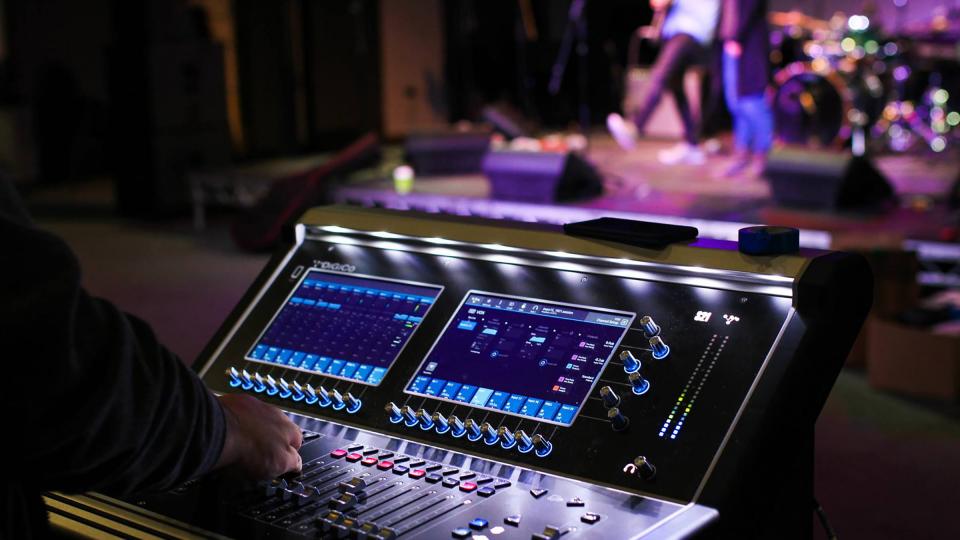
Find out more about the work our students produce and view some of their recent work by visiting our Music Technology ARTSFEST page.
Facilities
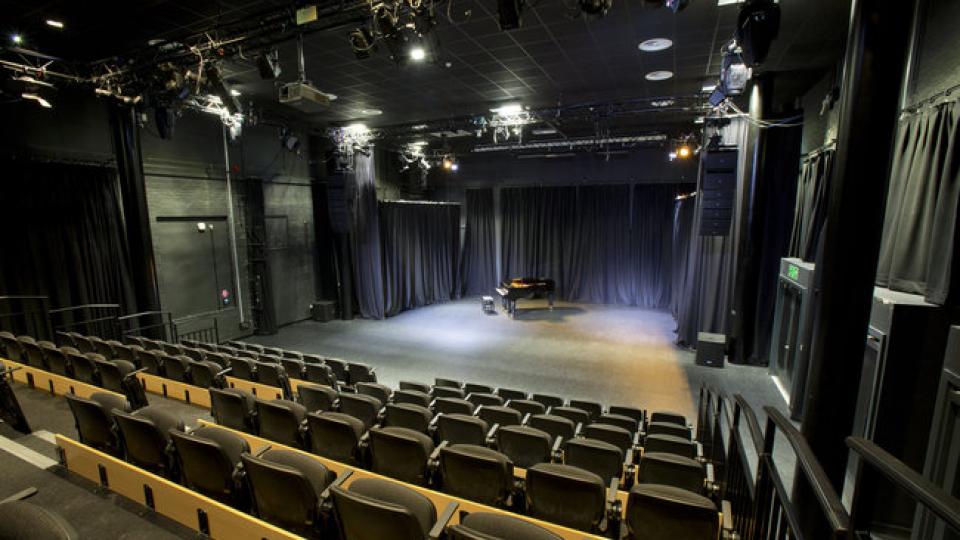
Performance spaces
Our flexible, professionally-equipped performance spaces include Lawrence Hall, a 200-seat black box studio theatre, and Vestry Hall, a classical music performance space featuring a Steinway B Concert Grand piano, concert tuned percussion and seating for up to 150
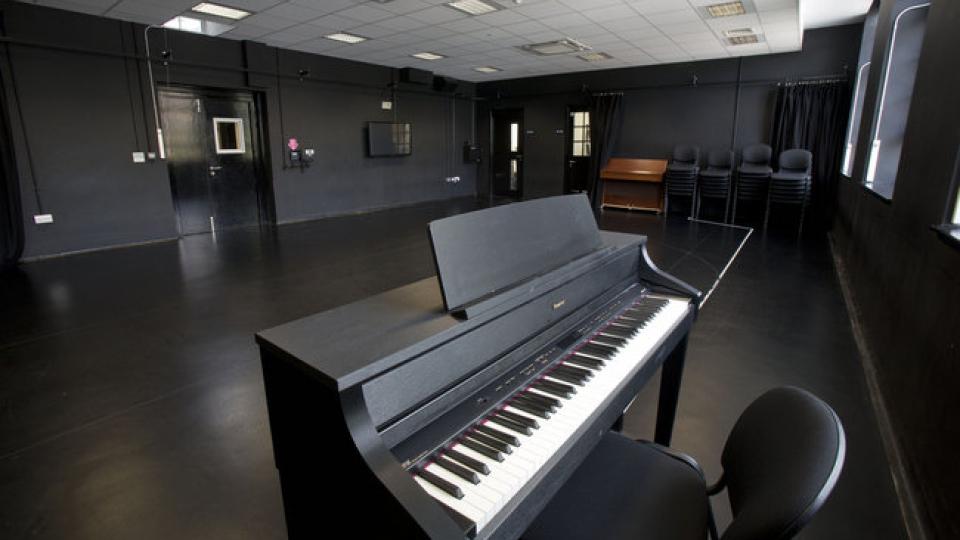
Production studios
We have four black box production rooms featuring performance dance floors, ballet barres, wall mirrors and ¾ drapes. All rooms have PA and AV support in all rooms. The digital stage pianos are by Roland.
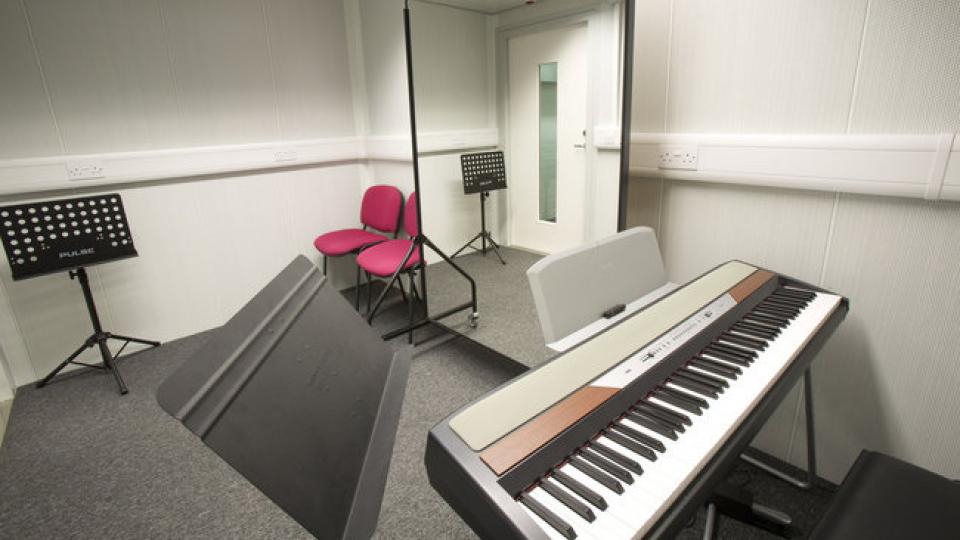
One-to-one teaching pods
We have five acoustically isolated teaching pods featuring Roland and Korg digital pianos and mirrors to facilitate one-to-one teaching in voice.
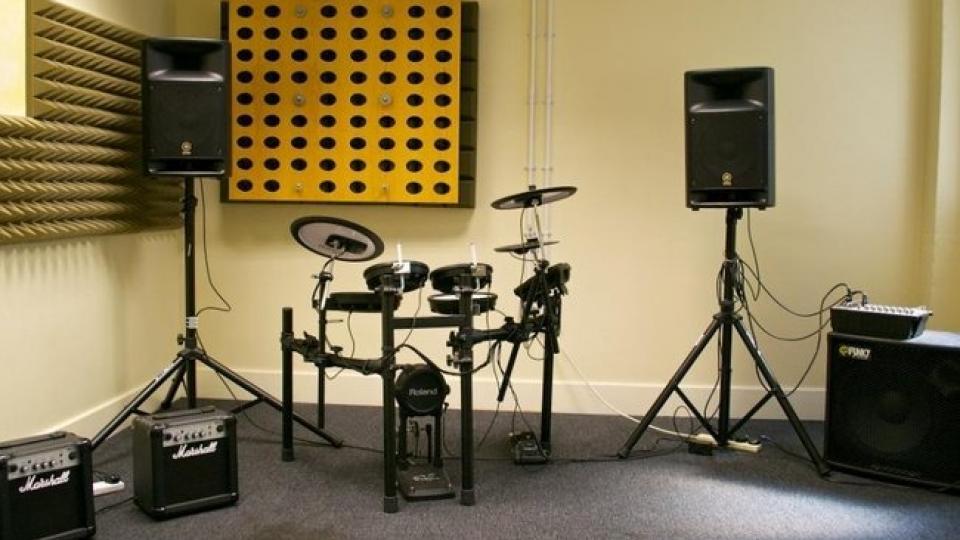
Music performance rooms
All music performance rooms feature drums and backline plus PA support.
- Drums by Roland and Pearl.
- Backline by Marshall, Orange, Line 6, Fender and Gallien-Kruger
- Stage pianos by Korg and Roland
- Synths by Roland and Kurzwiel
- PA by Yamaha, ABT and Nexo.
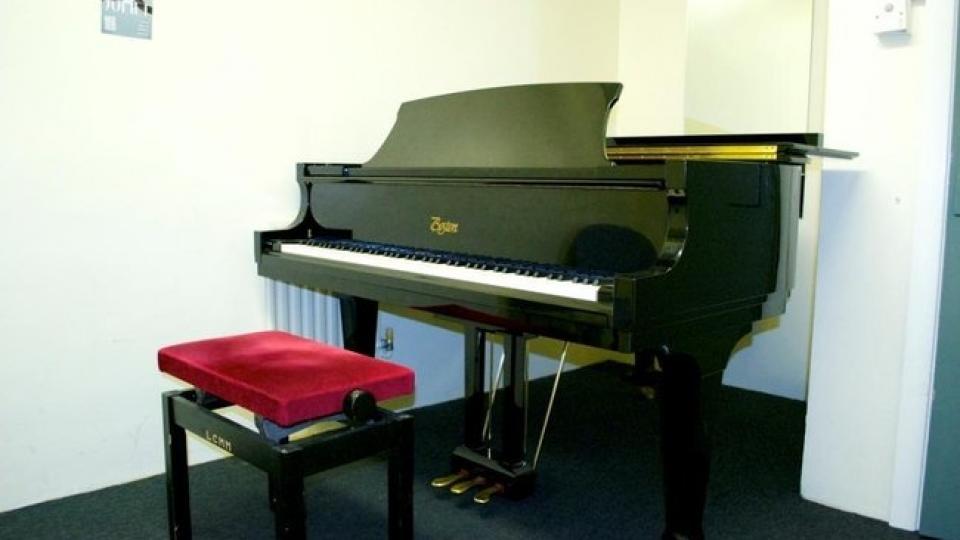
Basement practice rooms
- All LCM practice rooms benefit from LCM’s All Steinway School status to bring you the very best instruments.
- Three percussion practice and teaching rooms.
- Percussion rooms feature Pearl kits with recording and playback systems.
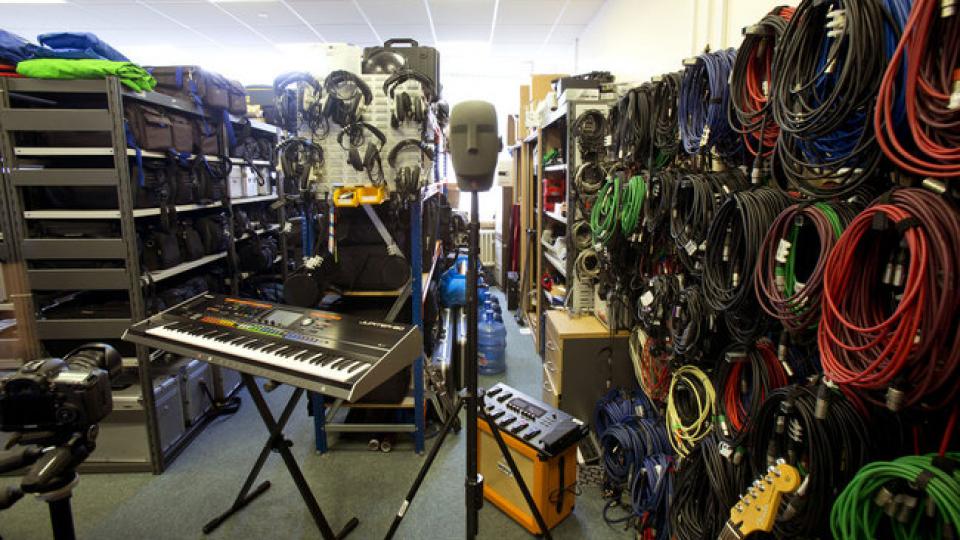
Media Resource Centre
At our Media Resource Centre (used by all subject areas) you'll find extensive portable audio recording systems, including up to 24 track digital HD recording and portable Focusrite RedNet systems.
There is also video-camera and accessory support, including LED and tungsten lighting systems, track and dolly systems and stedi-cam rigs.
Student life at UWL
Important notes for applicants
Disclaimer
*Modern universities - defined as higher education institutions that were granted university status in, and subsequent to, 1992.
**The National Student Survey 2023 and 2024 - Average of answers to all questions by registered student population. Excludes specialist institutions.
Testimonials - our students or former students provided all of our testimonials - often a student from the course but sometimes another student. For example, the testimonial often comes from another UWL student when the course is new.
Optional modules - where optional modules are offered they will run subject to staff availability and viable student numbers opting to take the module.
Videos - all videos on our course pages were accurate at the time of filming. In some cases a new Course Leader has joined the University since the video was filmed.
Availability of placements - if you choose a course with placement/internship route we would like to advise you that if a placement/internship opportunity does not arise when you are expected to undertake the placement then the University will automatically transfer you to the non-internship route, this is to ensure you are still successful in being awarded a degree.






